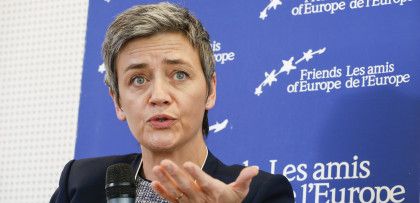Power utility PPC must soon start offering rival suppliers portions of its lignite-based electricity production, as specified in an antitrust agreement, despite subdued interest by possible buyers expressed in a February market test, the European Commission insists.
The subject, which has remained stagnant for months following slow development over the past 13 years or so – ever since legal action was taken against PPC in 2008 over its lignite monopoly – will be one of the topics to be discussed at a meeting today between energy minister Kostas Skrekas and the European Commission’s Vice-President Margrethe Vestager, also Brussel’s Commissioner for Competition.
Given Brussels’ insistence, the energy ministry has devoted considerable time over the past few weeks to shape a lignite electricity sale plan, based on a January agreement between the minister and the country’s creditor institutions, that could finally settle the dispute.
The January agreement calls for the sale of energy packages, either quarterly or annually, representing, in 2021, 50 percent of the previous year’s lignite-based production.
The percentage of PPC’s lignite-based electricity quantities to be offered to rival suppliers in 2022 and 2023 should be reduced to 40 percent of the previous year’s output, according to the agreement.
These amounts are seen as insufficient to make any real impact on the retail electricity market’s standings.
Other issues to be discussed at today’s meeting between Skrekas and Vestager include Brussels’ support for a grid back-up model as part of a wider Capacity Remuneration Mechanism (CRM). Athens favors a separate Strategic Reserve Mechanism to remunerate units that are made available by electricity producers for grid back-up services.
Skrekas is also striving to establish a mechanism that would subsidize RES producers for power purchase agreements (PPAs) with energy-intensive industrial enterprises.





